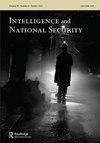总统的位子?林登·约翰逊、中央情报局和六日战争
IF 0.8
3区 社会学
Q1 HISTORY
引用次数: 0
摘要
本文章由计算机程序翻译,如有差异,请以英文原文为准。
A seat at the president’s table? Lyndon Johnson, the CIA, and the Six Day War
ABSTRACT The scholarly consensus regarding the CIA and the Six Day War holds that the Agency’s intelligence enjoyed a clear impact on President Johnson’s policy and thereafter markedly improved the White House-Langley relationship. Yet this narrative places excessive emphasis on the role of the Agency, while additionally overlooking several other international and domestic contextual factors that would have informed Johnson’s policy decision-making. Subsequently, evidence also suggests that Johnson’s relationship with the CIA and its intelligence did not improve after June 1967, and that DCI Helms did not become a close confidant of the President.
求助全文
通过发布文献求助,成功后即可免费获取论文全文。
去求助
来源期刊

Intelligence and National Security
Multiple-
CiteScore
1.80
自引率
41.70%
发文量
93
期刊介绍:
Intelligence has never played a more prominent role in international politics than it does now in the early years of the twenty-first century. National intelligence services are larger than ever, and they are more transparent in their activities in the policy making of democratic nations. Intelligence and National Security is widely regarded as the world''s leading scholarly journal focused on the role of intelligence and secretive agencies in international relations. It examines this aspect of national security from a variety of perspectives and academic disciplines, with insightful articles research and written by leading experts based around the globe. Among the topics covered in the journal are: • the historical development of intelligence agencies • representations of intelligence in popular culture • public understandings and expectations related to intelligence • intelligence and ethics • intelligence collection and analysis • covert action and counterintelligence • privacy and intelligence accountability • the outsourcing of intelligence operations • the role of politics in intelligence activities • international intelligence cooperation and burden-sharing • the relationships among intelligence agencies, military organizations, and civilian policy departments. Authors for Intelligence and National Security come from a range of disciplines, including international affairs, history, sociology, political science, law, anthropology, philosophy, medicine, statistics, psychology, bio-sciences, and mathematics. These perspectives are regularly augmented by research submitted from current and former intelligence practitioners in several different nations. Each issue features a rich menu of articles about the uses (and occasional misuses) of intelligence, supplemented from time to time with special forums on current intelligence issues and interviews with leading intelligence officials.
 求助内容:
求助内容: 应助结果提醒方式:
应助结果提醒方式:


